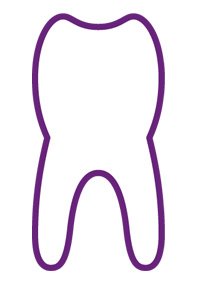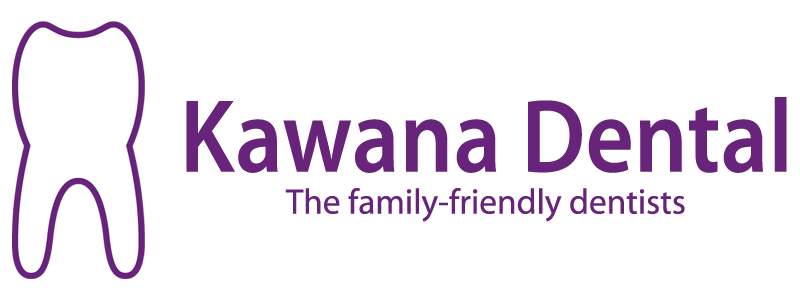Ensuring a happy dental experience for all ages is our aim at Kawana Dental. Too many people are still dental phobics on the Sunshine Coast!

Babies.
Oral care for children should begin as soon as their first teeth begin to erupt, with their first trip to the dentist occurring at around 12 months.
It is critical for the dentist and/or hygienist to have a look and show parents tips and tricks with teething and bottle routines to ensure the rest of the baby teeth erupt into a healthy mouth.
Did you know that parents and even significant carers of babies can and do “innoculate” babies with decay and disease causing bacteria (e.g Streptococcus mutans)?
Your child’s dental future and fears start in babyhood. Also see Pregnancy below.
Toddlers.
Early visits to the dentist should be made fun. We offer a Free First Visit to Toddlers.
We take toddlers for a ride in our “special” chair, give them a balloon and showbag and count their teeth together. This is often enough for a first visit.
We find that most children coming to the practice are genuinely happy to visit us, since a rapport and trust have been developed from pleasant previous short appointments.
Sometimes children have had a bad experience elsewhere, or simply are “picking up” on the (sometimes subconscious) fear that the family ( in particular Mum or Dad) are transmitting. Such “phobic” children are usually best treated with a number of “low key” short, fun visits initially, often with one of our hygienists, until that fear is eradicated (desensitisation process).
Further visits every 6 months are advised, particularly with the emphasis on low key hygienist polishing, checking cleaning, brushing and chatting about diet. Our hygienists may recommend diet or brushing modification or supplementation with fluoride or tooth mousse products.
If more treatment such as fillings or fissure sealing are required, a pleasant experience for everyone is assured.
A quick orthodontic evaluation at around 3 years and again at around 7 years is advised to “head off” problems.
There is a lot of information on diet and lunchbox ideas on the kids pages here. Early loss of milk (deciduous teeth) from decay can create major orthodontic headaches later on.e
Teenagers (tweens).
Sometimes teenagers need an extra bit of care and motivation in their diet and brushing to try to avoid getting severe problems.
A full mouth x-ray (OPG) is recommended at some point, particularly if there are any crowding or orthodontic issues. Sometimes products like Tooth Mousse are appropriate if there is early decalcification or signs of early problems.
Fissure sealing is often a good idea to prevent decay (and future fillings)
A recent study has shown that at least one in six children is affected by ” chalky teeth”.
Adults.
We are happy to help “phobic” parents or any other adults just like the kids, with the aid of laughing gas if necessary.
We have had many parents book in themselves after they have seen the happy treatment of their kids!! We have all heard stories of horror dentist visits….we’re happy if you use your kids as guinea pigs before you trust us. Those days of fear and pain truly are ancient history at Kawana Dental.
Whatever your problem, you can comfortably have cosmetic dentistry, fillings, inlays/onlays, crowns, bridges, implants, root canal therapy, extractions, jaw/TMJ treatment, whitening, bad breath treatment and snoring/sleep apnoea treatment. We will show you how to avoid “getting long in the tooth” i.e periodontal disease and have fresh breath(see hygiene services)
And when you are beautiful and healthy again, we can keep you there and show you how to AVOID EVER HAVING ANY MORE DECAY (click find out more below) and smile comfortably.
Pregnancy.
It’s vitally important, for both you and your baby, to take good care of your oral health while you are pregnant.
This is a time when it is very easy for your teeth and gums to go downhill quickly. Pregnancy causes hormonal changes that increase your risk of developing gum disease, and you may notice your gums bleed more easily. Common things like morning sickness (frequent vomiting) can cause significant damage to your teeth. Your oral health can affect the health of your developing baby; it has been shown that women with gum disease/inflammation take longer to conceive than those who have a healthy mouth, and are at higher risk of having babies with low birth weights.
Below are some suggestions for maintaining good oral health, as well as your baby’s health and safety, before, during, and after your pregnancy.
Before you get pregnant: Make a dental appointment before getting pregnant (if possible). In this way, your teeth can be professionally cleaned, your gum tissue can be carefully examined, and any oral health problems identified can be treated in advance of your pregnancy.
While you are pregnant: Tell your dentist (and doctor) if you know you are pregnant or are planning to become pregnant. This will help your health care providers plan for any treatments or procedures. It’s always best to complete any major dental treatment and x-rays prior to pregnancy. Routine dental care, on the other hand, can be received at any time during pregnancy, although you might be most comfortable in the second trimester.
- Tell your dentist the names and dosages of all medications you are taking, including medications and prenatal vitamins prescribed by your doctor, as well as any specific medical advice your doctor has given you to follow. Your dentist may need to alter your dental treatment plan based on this information. Certain drugs, for example, such as tetracycline, can affect the development of your child’s teeth and should not be given during the pregnancy.
- We tend to try to avoid routine x-rays during pregnancy. If x-rays are required (such as in a dental emergency, infection or pain), your dentist will use caution to safeguard you and your baby.Advances in technology mean the radiation involved in dental imaging is exceptionally low, and there is zero evidence of disturbance in the development of an embryo or foetus from dental radiation, so there is no need to be concerned if you require an x-ray while pregnant.
- Don’t skip your dental checkup appointment simply because you are pregnant and believe this appointment is not important. Now more than any other time, regular examinations are very important. Pregnancy causes hormonal changes that put you at increased risk for gum disease and for tender gums that bleed easily a condition called pregnancy gingivitis. To remove irritants, control plaque, and maintain optimum oral health, rather than fewer dental visits you may actually benefit from more frequent professional cleanings during your second trimester or early third trimester.
- Pay particular attention to any changes in your gums during pregnancy. If tenderness, bleeding or gum swelling occurs at any time during your pregnancy, talk with your dentist, hygienist or periodontist as soon as possible. Follow good oral hygiene practices to prevent and/or reduce gingival problems, including brushing your teeth at least twice a day and flossing at least once a day. Use a good-quality, soft-bristled toothbrush. Use a fluoride-containing toothpaste and brush for at least 2 minutes to remove the plaque that forms on your teeth.
- If morning sickness is keeping you from brushing your teeth, change to a bland-tasting toothpaste during your pregnancy. Ask your dentist or hygienist for recommend brands.
- Rinse your mouth out with water or a bicarb soda rinse if you suffer from morning sickness and have bouts of frequent vomiting, as the acids from your stomach can damage your teeth.
- Ask your dentist about the need for fluoride supplements. Since fluoride is found in water and almost all brands of toothpaste, fluoride supplementation may not be necessary.
- Avoid sugary snacks. Sweet cravings are common during pregnancy. However, keep in mind that the more frequently you snack, the greater the chance of developing tooth decay. Additionally, studies have shown that the bacteria responsible for tooth decay are passed from the mother to the child. So be careful of what you eat.
- Eat a healthy, balanced diet. Your baby’s first teeth begin to develop about three months into your pregnancy. Healthy diets containing dairy products, cheese and yogurt are a good source of these essential minerals and are good for your baby’s developing teeth, gums, and bones.
After you have had your baby: If you experienced any gum problems (including pregnancy gingivitis or a small growth in your gums known as an epulis) during your pregnancy, see your dentist soon after delivery to have your entire mouth examined and your gum health evaluated.


